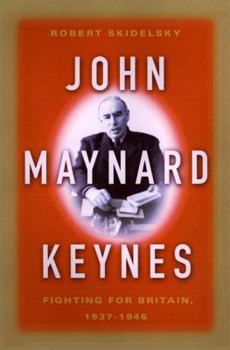John Maynard Keynes: Fighting for Freedom, 1937-1946
(Book #3 in the John Maynard Keynes Series)
Select Format
Select Condition 
Book Overview
The eagerly awaited final volume of Robert Skidelsky's definitive biography of John Maynard Keynes covers the period from 1937, when Keynes had become the world's most influential economist, to his... This description may be from another edition of this product.
Format:Hardcover
Language:English
ISBN:0670030228
ISBN13:9780670030224
Release Date:December 2001
Publisher:Viking Books
Length:580 Pages
Weight:2.23 lbs.
Dimensions:1.8" x 6.4" x 9.3"
Customer Reviews
2 ratings
In the short run we are still alive
Published by Thriftbooks.com User , 20 years ago
The last part of Robert Skidelsky's magnificent biography of J.M. Keynes is a tale about the fall of the British Empire with Keynes as one of its most clairvoyant and active go-betweens trying to avoid the disaster. Great-Britain had won the war but it was bankrupt, crushed by its debt contracted to buy US weapons. This book shows clearly through its analysis of the Bretton-Woods negotiations and the discussions about the conversion of British debt, that the ultimate goal of the US Administration was to get Great-Britain on its knees and to take its place as world leader. The US preferred an alliance with te Soviet Union against Britain. Their most important negotiator H.D. White was a convinced Soviet spy. Keynes defended exhaustingly Britain's role in world matters by begging time for a reconversion of the British industry from a war to a civilian economy and for safeguarding its Commomwealth with its preferential tariff and pound sterling payment system. The humiliatig conditions for its debt conversion imposed by the US would cripple the British economy for years. The suicidal internecine European wars created a new world hegemon: the US. Before the war, Keynes defended his 'Treatise' policies, but saw them applied in Germany by a very clever economist, Hjalmar Schacht, who also saved the German economy internationally by creating a bilateral trade system. Prof. Skidelsky shows us also pregnantly the deterioration of Keynes's physical condition, aggravated by his exhausting travels, difficult (empty handed) negotiations and even hard opposition at home when he was in the US. One could perhaps slightly criticize the exhaustive excerpts of letters or the extremely detailed evolution of the negotiations in Bretton-Woods or about British debt relief. But, all in all, this is a fascinating read.
Large enough to offer details
Published by Thriftbooks.com User , 21 years ago
There was a time when John Maynard Keynes was not the most famous living economist. Then he was. Then, after he died, he seemed to be more useful than Karl Marx to anyone who was interested in how modern economies actually operate in the best times, when statistics actually reflect the level of some real activities. Two earlier biographies by Robert Skidelsky cover the years in which Keynes gained in stature and wrote his General Theory of Employment, Interest and Money (1936), described by Joseph Schumpeter as "the dying voice of the bourgeois crying in the wilderness for the profits it dare not fight for." (FIGHTING FOR FREEDOM 1937-1946, p. 4). This final volume starts with the problems with his heart that, after ten years of making Keynes an invalid, deprived the world of his advice at a time when situations continued to change at a pace which needed someone to keep applying different aspects of the General Theory in time to keep most elements of society from feeling that they were being swindled. He never had enough power to make a miraculous demonstration of anything, but the spread of American wealth after World War Two made many professionals think that it was possible, if not already proved, that happy days could keep reappearing here again far more optimistically than Joseph Schumpeter's dour statement.Economics has become a science which is widely taught at a college level. Robert Skidelsky seems comfortable with writing about the political struggles involved, the nature of intellectual controversies in the field, and he is generous in his comments about Friedrich von Hayek, author of THE ROAD TO SERFDOM, and Milton Friedman, who emphasized other aspects of political economy. The years 1937-1946 had major problems of their own, and there is far more attention in FIGHTING FOR FREEDOM paid to the people that Keynes had contact with and responsibilities to. The Preface to the American Edition is dated 6 October, 2001. Already the author was prepared to apply a lesson of this book to our life and times:"To be reminded of the realities of alliance politics, even in the case of such close partners as Britain and the United States, is timely in the aftermath of the tragic events of 11 September, when the United States is working to construct a global coalition against terrorism. In 1940, it was British vulnerability which threw it into the arms of the United States. America did not fail its fellow-democracy; but also used the occasion to settle old scores, and secure pole position in the post-war international order." (p. xv).A major episode in this book recounts how an economic genius approaches the United States of America on behalf of a bankrupt country at the end of a big war to get debts pushed far enough into the future to be able to convince himself `If we don't make it by then, we're sunk anyway,' only to be asked why he didn't bring along the trade representatives. Countries which did not get involved in the current end





